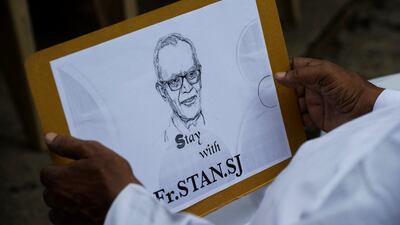Indians expressed shock and grief on Monday over the death of an octogenarian Jesuit priest and rights activist incarcerated for over nine months under the country's stringent anti-terrorism laws.
Father Stan Swamy, 84, had contracted Covid-19 during his time in custody and died at a Mumbai hospital early on Monday. He was awaiting trial over his alleged role in the deadly caste clashes in western Maharashtra state in 2018.
Mr Swamy was arrested last October and remained in jail despite suffering from advanced Parkinson’s disease and waning health.
He and more than a dozen lawyers, academics and activists were arrested under anti-terrorism laws over allegations of making inflammatory speeches leading to clashes on the bicentennial anniversary to commemorate the Battle of Koregaon-Bhima between Dalits (formerly untouchables) and upper-caste Hindus.
opposition Congress leader
Several of his bail petitions were rejected under the Unlawful Activities (Prevention) Act, which was designed to deal with offences such as commission, funding and support of “unlawful activities” and “terrorist acts” in India.
In practice it means any action that supports or is intended to support secession of any part of India, or “disclaims, questions, disrupts or is intended to disrupt” the sovereignty and territorial integrity of India is illegal.
The act has provisions to allow extended detention and no bail, leaving people languishing in prison for years or decades before they are either convicted or acquitted.
One person was killed in the violence after the event known as Elgaar Parishad, where hundreds of thousands of Dalits had assembled to mark the victory.
India’s counterterrorism agency accused Mr Swamy and others of being members of a banned left-wing armed group.
Critics said their arrests by Prime Minister Narendra Modi’s government were part of a purge of dissidents and activists fighting for rights of marginalised communities like Dalits, people who continue to suffer discrimination under the Hindu caste system.
Mr Swamy’s case remained in the public focus because of his advanced age and medical condition, including his months-long legal battle to procure a bottle with a straw attached to drink water after prison authorities denied his requests.
In May, a court ordered prison officials to admit him to a private hospital after he contracted Covid-19, amid allegations that he was being denied proper medical care.
His doctor Ian D’Souza informed Mumbai High Court that he died of pulmonary infection, Parkinson’s disease and post-coronavirus complications.
Mr Swamy worked in support of tribal rights for more than five decades in Jharkhand, eastern India.
Social media was awash with grief, anger and condolences for the Jesuit priest.
“Extremely sad to know about the demise of Father #StanSwamy our system had been so, so cruel and callous. I don’t think at all that he deserved this for all he did for the poor,” historian Sir Irfan Habib wrote on Twitter.
“Heartfelt condolences on the passing of Father Stan Swamy. He deserved justice and humaneness,” Rahul Gandhi, the opposition Congress leader tweeted.
His lawyer Mihir Desai blamed the authorities for Mr Swamy’s death and demanded a judicial investigation.
“We feel the National Investigation Agency as well as the prison authorities are responsible for his death. And we will take this forward,” Mr Desai told The National.


